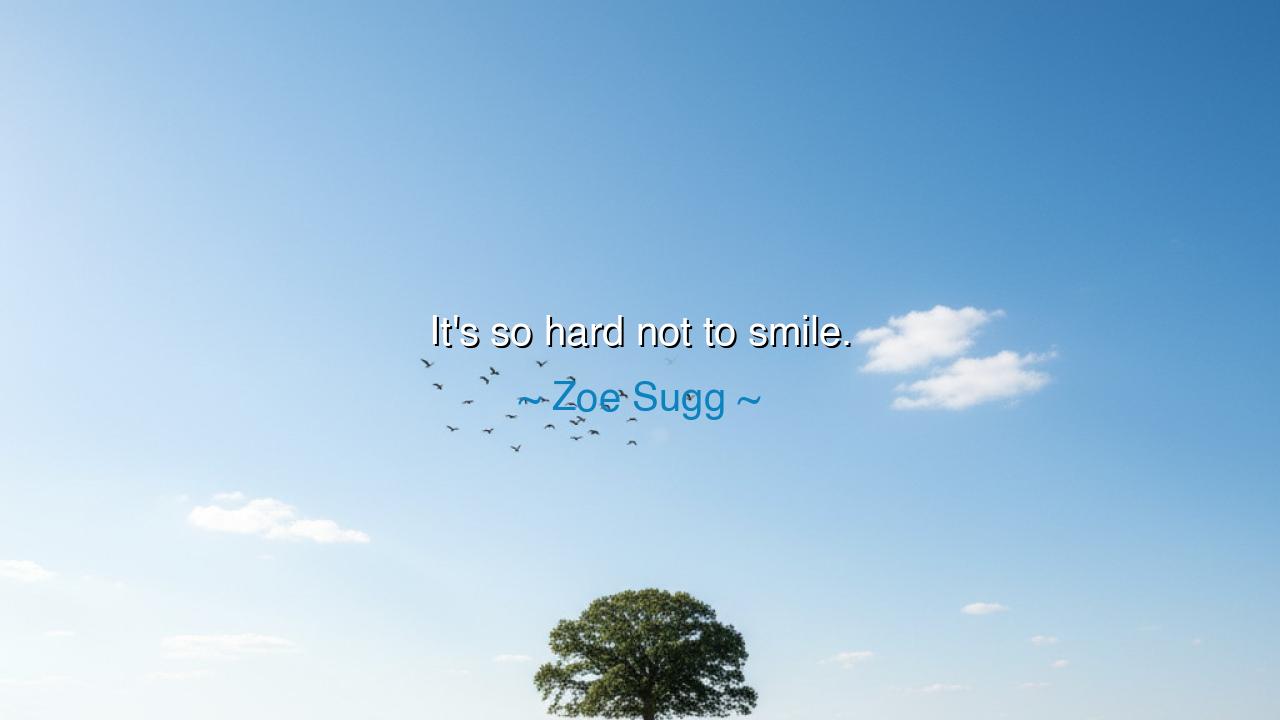
It's so hard not to smile.






Zoe Sugg once spoke with a lightness that carries profound weight: “It’s so hard not to smile.” At first, these words seem simple, almost fleeting, as though tossed off in a moment of joy. Yet hidden within them is a deep truth about the nature of happiness, about the contagiousness of delight, and about the strength of a spirit that overflows with light even when silence or restraint is possible. To say that it is hard not to smile is to admit that joy has overcome resistance, that the heart has so swelled with gladness it must shine outward.
The ancients revered this kind of joy, seeing it not as trivial, but as divine. For them, the smile was more than an expression—it was the outward sign of inner harmony with the cosmos. In the temples of Greece, sculptors carved faint smiles upon the lips of their gods and heroes, for the smile symbolized serenity and power, the calm of one who knows their place in the order of things. Zoe’s words remind us that such joy is not forced; it is natural, uncontainable, rising like the sun regardless of whether the world asks for it.
History shows us how irresistible joy transforms even the darkest times. Think of Anne Frank, who, though confined within hiding and shadow, often wrote of the beauty of the world, the goodness she still believed in people, and the moments of laughter that sustained her family. For her, too, it was “so hard not to smile,” even in conditions that would break most hearts. Such joy is not naïve—it is defiant. It proclaims: Though the world is heavy, I will not let it crush the light within me.
Zoe Sugg’s observation also speaks to the contagious nature of happiness. When one person smiles, others instinctively return it. This is why leaders, teachers, and parents who smile bring strength to those around them. A smile disarms fear, softens anger, and creates a bridge where words fail. To find it hard not to smile is to be a vessel of generosity, for each smile given freely multiplies in the hearts of others. What begins as a single spark becomes a fire that warms whole communities.
There is also humility in her phrase. She does not boast, “I always smile,” as though it were an achievement. Instead, she admits that joy itself overpowers her restraint. This humility reveals a deeper lesson: that true joy is not crafted by willpower, but arises naturally when one’s heart is aligned with gratitude, love, or beauty. The smile becomes inevitable, as effortless as breathing, as natural as the tide’s return.
Yet the lesson here is not only to recognize joy, but to cultivate the conditions for it. If you wish to live a life where it is hard not to smile, surround yourself with beauty, with kindness, with people who uplift you. Seek out gratitude each day. Look for small wonders, the ones the hurried world overlooks. For joy does not always come in grand events—it often comes in simple things: a kind word, the warmth of the sun, the sound of laughter. To notice these is to feed the soul until the smile can no longer be contained.
So, my children, let Zoe Sugg’s words echo in your hearts. Strive to live in such a way that joy is not rare but constant, so that your spirit overflows until it is indeed so hard not to smile. And when you do smile, do not withhold it. Share it with the weary, the broken, the lonely. For your smile may be the spark that keeps their light alive. In this way, joy becomes more than a feeling—it becomes a gift, a legacy, a force as enduring as the ancients taught, shining through you into the world.






AAdministratorAdministrator
Welcome, honored guests. Please leave a comment, we will respond soon